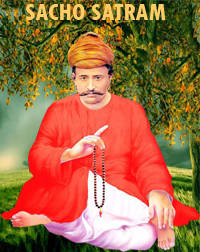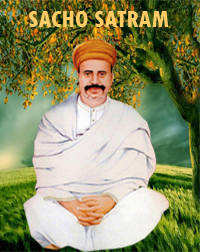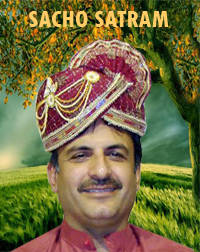On the sacred and spiritually enriching Thursday of Chaaliha Saheb (03/07/2025), Hazir Swaroop Sai Sadhram Saheb lovingly shared profound insights on life and knowledge.
Each one of us possesses intelligence, we are aware of what is right and what is wrong, what leads to progress and what leads to downfall. Yet, to truly grasp the depth of life, we need discernment (vivek), knowledge, clarity, and the uplifting company of noble souls.
Having knowledge is one thing. But the real question is, are we applying it? Do we just know, or do we live what we know? Information shows us what exists, but wisdom teaches us how to live by it.
In today’s world, knowledge is available to all. But how much of it have we genuinely used to transform our lives?
It is important to reflect, despite having vast knowledge, how much have we really changed in our day to day life? Have our habits improved? Have our speech, thoughts, behavior, and interactions become more refined? Have we fulfilled our responsibilities with greater devotion? Has our character become gentler, our emotions purer?
Hazir Swaroop Sai Sadhram Saheb emphasized that the more we know, the more beautiful and refined our life should become. With the blessings of saints, the knowledge we gain through Satsang and sacred texts should make our life more radiant than heaven itself.
But the real introspection lies here, With all this understanding, have we made our life heavenly, or turned it into chaos? Do we live with peace, or are we filled with anger and jealousy? Has love blossomed within, or has hatred taken root?
If we are honest, we will see that often our life reflects the opposite of the knowledge we carry, because we don’t practice what we know. Even Ravan had immense knowledge, but he failed to live by it.
Knowledge is like a mighty eagle, it can soar high and touch the heavens. But the moment it’s drawn to something impure on the ground, it dives down. Likewise, we too fall, not because we lack knowledge, but because we don’t live by it.
And that’s why we come to the temple of the Satguru, to turn knowledge into action, and understanding into a way of life.
Respect is earned through our actions, not merely through knowledge.
To help us live this truth, Chaaliha Saheb offers us a divine opportunity.
During this sacred time, we practice discipline, devotion, meditation, service, charity, and righteous living. These practices teach us to walk our talk, to live what we know.
Daan isn’t just about giving money. True Daan lies in helping others, uplifting them, feeding the hungry, protecting the weak, sharing knowledge, and giving with love and humility.
To bow with reverence at the feet of the True Sai,
To instill values in children,
To respect our elders,
To treat every being with kindness,
These are the true pillars of a virtuous life.
We worship rivers, the earth, the sun, the moon, the sky, the wind, fire, and trees—not merely out of ritual, but in gratitude. For they give selflessly:
The sun offers light, the moon brings calmness, trees bear fruits, rivers provide water, and the earth gives us abundance. Nature teaches us the sacred art of giving. That is why we bow before it in reverence.
Even forgiving someone who has wronged us is a form of charity.
When knowledge is used with noble intent, it becomes a blessing. But when the same knowledge is misused, it becomes destructive.
If Ravan, in the guise of a sage, had done something good, his glory would have grown. But he misused that form for evil—by abducting Maa Sita—and was punished for it.
Even when we temporarily adopt a noble appearance and use it to do good, it brings blessings.
For instance, once a man carrying money saw bandits approaching. Frightened, he ran into a nearby hermitage where a sadhu was seated. He requested the sadhu to safeguard his money, explaining that when the bandits found nothing on him, they would let him go, and he would later return to collect it.
The sadhu told him to place the money in a corner.
The bandits searched the man, found nothing, and let him go.
When the man returned, he was shocked to discover that the so-called sadhu was actually the leader of the dacoits, and his gang was dividing loot.
Frightened, the man began to leave, but the dacoit leader stopped him and said,
“Don’t be afraid. You gave me your money trusting me to be a sadhu. I will not betray that trust. Even though I wore this robe for another reason, I will not disrespect the sacred form or the faith you placed in it.”
He returned the money, honoring the man’s trust.
Not applying our knowledge in the right way is the root cause of sorrow.
When we study the life of Shahanshah Satguru Swami Sai Satramdas Saheb ji, we find that every teaching He gave, He lived Himself. The path of love He showed—He was the embodiment of that love.
Hazir Swaroop Sai Sadhram Saheb often reminds us that unless we live our knowledge, it bears no fruit. Knowledge without action leads only to negative karma.
Saijan shared an example related to Chaliha Saheb. Many people observe it, and many simply participate. But there is a difference.
Those who truly observe Chaliha Saheb live by its rules and spirit.
Others may know about it and speak about it—but if they don’t live it, it remains theory, not practice.
Without practice, knowledge does not become life.
That’s why it’s said: Life and knowledge are two separate things.
Saijan beautifully said,
Even within our own families, if we keep advising one another without applying those teachings ourselves, how will we ever walk the path of harmony together? If each one only tells others to live rightly, but doesn’t live it themselves, how will the family move forward in truth?
The very purpose of Chaliha Saheb is to turn knowledge into action.
To practice daily discipline,
To meditate,
To remember the Divine,
To worship,
To recite sacred verses,
To engage in righteous acts,
To behave kindly,
To respect all,
To uplift one another.
True knowledge is not what we preach to others.
True knowledge is what we live by, what we embody in our conduct, and what we use to shape a noble life.



